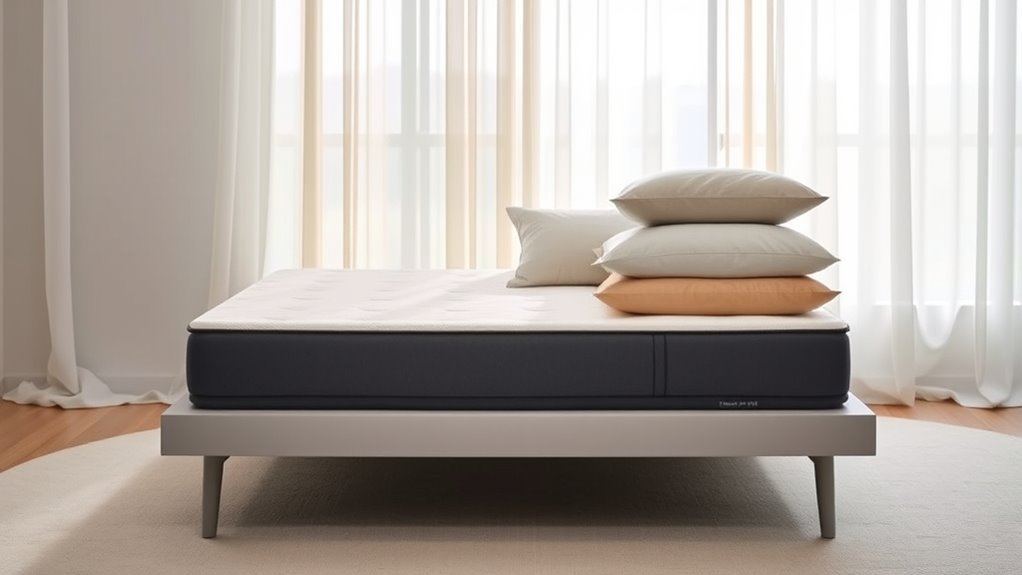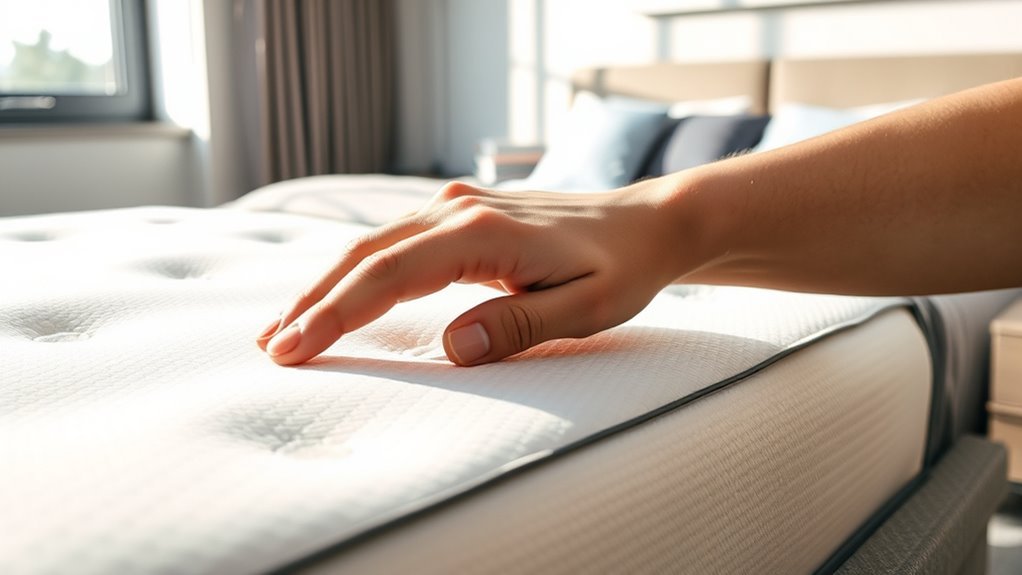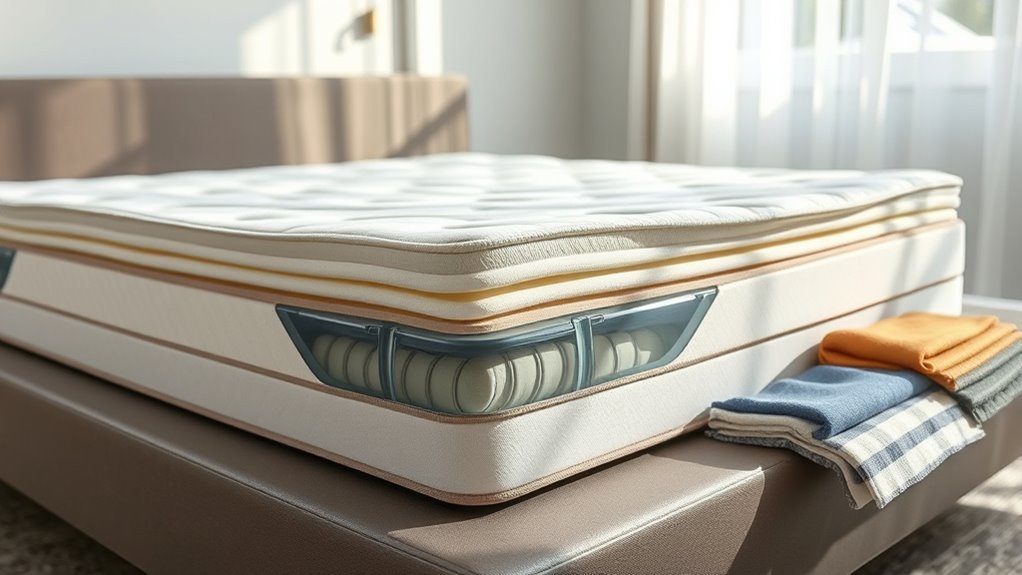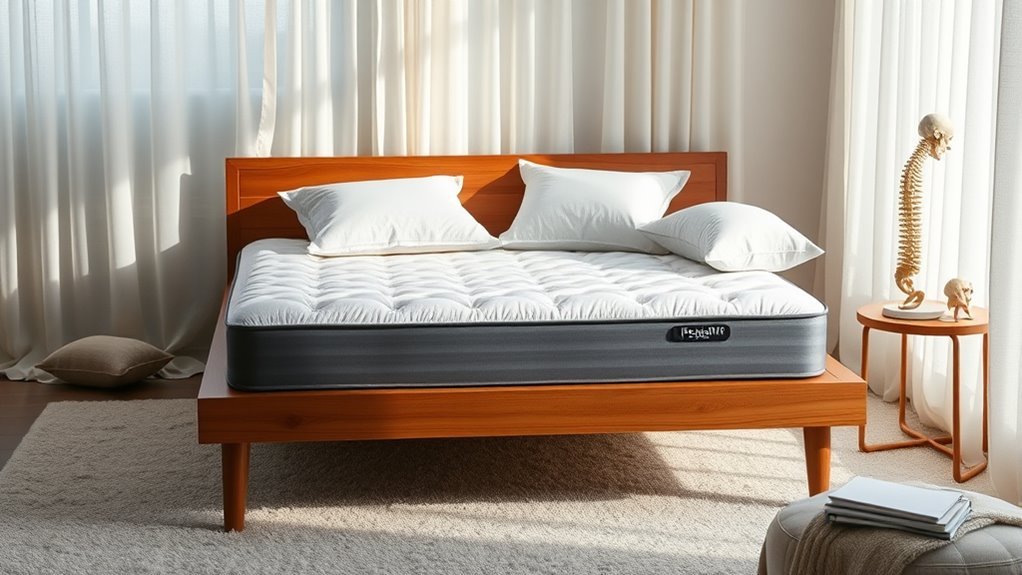When selecting a mattress for scoliosis support, prioritize firmness to maintain spinal alignment and reduce discomfort. Look for materials like memory foam or latex that contour to your body and provide pressure relief. Guarantee the mattress distributes weight evenly and accommodates your body type. Consider targeted support zones for different body areas. Additionally, use proper pillows for neck support. Explore further to uncover additional tips for enhancing your sleep comfort and support.
Understanding Scoliosis and Its Impact on Sleep

When you have scoliosis, understanding its impact on sleep is essential for managing discomfort and ensuring restorative rest. Scoliosis symptoms, such as back pain and muscle tension, often worsen at night, disrupting your sleep quality. The curvature of the spine can create pressure points, leading to discomfort in various sleeping positions. As a result, you may find it challenging to achieve deep sleep, which is vital for overall health. It’s important to recognize that poor sleep can exacerbate the fatigue and pain associated with scoliosis, creating a cycle of discomfort. By addressing these challenges through proper sleep strategies and mattress selection, you can enhance your chances of achieving more restful, uninterrupted sleep, ultimately improving your quality of life.
Importance of Firmness for Scoliosis Support

Selecting the right mattress firmness is essential for providing adequate support to individuals with scoliosis. The firmness level of your mattress considerably affects spinal alignment and comfort during sleep. Here are key considerations:
- Proper spinal alignment: A firm mattress helps maintain an even spine position, reducing discomfort.
- Pressure relief: It distributes body weight evenly, minimizing pressure points.
- Support for curves: Different mattress types, like hybrid or innerspring, can offer varying firmness levels that cater to your specific needs.
- Durability: Firmer mattresses tend to last longer, ensuring consistent support over time.
- Personal preference: Comfort varies; find a balance between firmness and softness that feels right for you.
Choosing the right firmness can enhance your sleep quality and overall well-being.
Mattress Materials: Which One Is Right for You?

How do you know which mattress materials will provide the best support for your scoliosis? Both memory foam and latex mattresses offer unique benefits. Memory foam contours to your body, providing pressure relief and support where needed. It adapts to your shape, which can minimize discomfort during sleep. On the other hand, a latex mattress is known for its durability and responsiveness. It offers a firmer feel, promoting spinal alignment while still providing some contouring. If you prefer a cooler sleep surface, latex might be the better choice due to its breathability. Ultimately, consider your personal comfort preferences, body type, and sleeping position to determine which material aligns best with your needs for effective scoliosis support.
The Role of Spinal Alignment in Mattress Selection
Spinal alignment plays an essential role in choosing the right mattress, especially for individuals with scoliosis. Proper alignment helps mitigate discomfort and supports your spinal curvature. When selecting a mattress, consider the following factors:
- Firmness level: Balance between support and comfort.
- Mattress height: Make sure it accommodates your body type for ideal alignment.
- Material responsiveness: Look for materials that contour to your spine without sinking.
- Support zones: Choose a mattress with targeted support for different body areas.
- Trial period: Opt for brands that offer a sleep trial to assess spinal alignment.
Pressure Relief Features to Consider
When considering a mattress for scoliosis support, pressure relief features are essential for minimizing discomfort during sleep. Look for materials that provide ideal pressure distribution, such as memory foam or latex. These materials contour to your body, alleviating pressure points and promoting better alignment. Additionally, consider mattresses with zoned support systems, as they offer varying firmness levels to enhance comfort levels across different body areas. This targeted support can be particularly beneficial for individuals with scoliosis, as it helps maintain spinal posture while reducing pressure on specific regions. Ultimately, selecting a mattress that balances support and cushioning will contribute greatly to your overall sleep quality and comfort, empowering you to wake up refreshed and ready for the day.
Trial Periods and Warranty: Ensuring Your Investment
While selecting a mattress for scoliosis support, it’s important to pay attention to trial periods and warranty options, as they can markedly impact your investment. A longer trial length allows you to assess comfort and support effectively. Furthermore, warranty coverage protects you from defects, guaranteeing you make a sound choice.
- Look for trial lengths of at least 90 days.
- Confirm the warranty covers at least 10 years.
- Verify what specific issues the warranty addresses.
- Understand return policies during the trial period.
- Check if there are any associated fees for returns.
Additional Accessories to Enhance Comfort and Support
To further improve your sleep quality and spinal support, consider incorporating specific accessories. The right pillows can promote proper spine alignment, while mattress protectors can extend the life of your investment. Additionally, adjustable bed frames offer customizable positioning to enhance comfort and alleviate pressure points.
Pillows for Spine Alignment
How can the right pillows contribute to better spine alignment for those with scoliosis? Proper pillow height and cervical support are essential for maintaining a neutral spine position during sleep. Here are some key considerations:
- Choose a pillow that supports your neck’s natural curvature.
- Opt for adjustable pillows to customize the height for your comfort.
- Consider contour pillows designed for cervical support, which cradle the head and neck.
- Use a body pillow to align your hips and spine if you sleep on your side.
- Replace old pillows that have lost their shape to guarantee peak support.
Mattress Protectors for Longevity
Choosing the right mattress protector is essential, as it not only safeguards your investment but also enhances the overall comfort and support for individuals with scoliosis. There are several mattress protector types, including waterproof, hypoallergenic, and breathable options. Each type serves a distinct purpose, ensuring that your mattress remains clean and extends its lifespan. Regular maintenance is vital; follow cleaning guidelines specific to your protector type to prevent damage and maintain its protective qualities. For instance, many can be machine washed, but always check the label for temperature settings. By selecting an appropriate protector, you not only enhance your sleeping environment but also contribute to better spinal alignment and overall well-being. Prioritize comfort and longevity with the right choice.
Adjustable Bed Frames Benefits
While a quality mattress protector enhances comfort and longevity, an adjustable bed frame can greatly improve support for individuals with scoliosis. These frames allow you to customize your sleep positions, which may alleviate discomfort and promote better spinal alignment.
Benefits of adjustable bed frames include:
- Adjustable height for personalized comfort
- Enhanced support for different body areas
- Improved circulation by elevating legs or head
- Easier shifts from sitting to lying down
- Reduced snoring by elevating the upper body
Frequently Asked Questions
Can a Mattress Aggravate Existing Scoliosis Symptoms?
Yes, a mattress can aggravate existing scoliosis symptoms, much like a poorly fitting shoe can cause blisters. If the mattress firmness isn’t right for you, it can disrupt spinal alignment, leading to discomfort and increased pain. A too-soft mattress may not provide necessary support, while one that’s too firm can create pressure points. Finding a balance in firmness is essential to maintain proper alignment and alleviate your symptoms for a better night’s sleep.
How Often Should I Replace My Mattress for Scoliosis?
You should replace your mattress every 7 to 10 years, especially if you have scoliosis. Signs of needing a replacement include sagging, lumps, or discomfort that disrupts your sleep. A mattress’s lifespan can vary based on materials and usage, but if you notice any of these replacement signs, it’s time to contemplate a new one. Prioritizing a supportive mattress can greatly impact your comfort and overall health.
Are Adjustable Mattresses Beneficial for Scoliosis?
Yes, adjustable mattresses can be beneficial for scoliosis. They allow you to customize adjustable firmness, which can help alleviate discomfort and support proper spinal alignment. By adjusting the firmness to suit your needs, you can enhance your sleep quality, making it easier to find a comfortable position throughout the night. This adaptability is especially valuable for those with scoliosis, as it provides personalized support tailored to your unique body shape and sleeping habits.
What Is the Best Sleeping Position for Scoliosis?
The best sleeping position for scoliosis is often side sleeping, as it can help maintain spinal alignment. When you sleep on your side, consider using a pillow between your knees to reduce strain on your lower back. This position can also relieve pressure on your spine. It’s crucial to find ideal positions that work for your specific curvature, as individual needs may vary. Experimenting with these positions can lead to more restful sleep and improved comfort.
Can Pillows Affect Spinal Alignment in Scoliosis Patients?
Yes, pillows can greatly affect spinal alignment in scoliosis patients. Using the right pillow type, such as contour or cervical pillows, can help maintain proper neck and spine alignment. It’s also essential to take into account your sleeping surface; a supportive mattress complements the pillow’s role in maintaining alignment. By ensuring both your pillows and mattress work together, you can promote better spinal health and reduce discomfort during sleep, ultimately enhancing your overall well-being.



